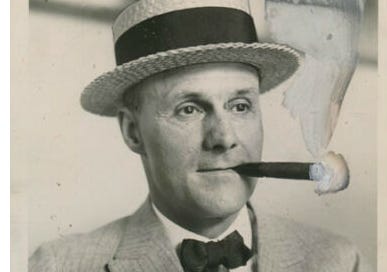The Johnson-Jeffries fight program
It was originally billed as, “The Incomparable Prize Fight”. Later on, it became better known as the “Fight of the Century,” the first such bout to be billed as such. In reality, it was a mismatch of epic proportions. On July 4, 1910, in Reno, Nevada, in front of 20,000 rabidly anti-Black fight fans, former world heavyweight champion James J. Jeffries, challenged the current and first ever African American world heavyweight champion, Jack Johnson, for the undisputed world crown.
Johnson and Jeffries both received well in excess of $100,000 each for the fight. They stood to make considerably more from the showing of the film of their bout but, The Johnson-Jeffries Fight film was subsequently banned by the federal government for over half a century. The government feared that exhibiting the film of the bout would cause race riots throughout America. Even without the film, the outcome of the bout caused racial unrest throughout the United States. And a slew of deaths, both Black and white.
Johnson was eager to fight Jeffries because of the money involved and also because he wanted to prove that Jeffries was not his equal in the ring. Jeffries at first resisted the many offers that came his way to end his retirement and take on Johnson in order to redeem the integrity of the white race. American novelist and bigot Jack London urged Jeffries to return to the ring to wipe Johnson’s golden smile from his ebony face. Johnson had many gold-capped teeth and exhibited them frequently by smiling often while beating his white opponents senseless.
Jeffries had retired as heavyweight world champion six years earlier, in 1904, and was happy working on his alfalfa farm. He was financially well-off, three-hundred pounds and enjoying his retirement from the squared circle. He did not crave nor did he want the grief of being in the national spotlight or of preparing for another prizefight. He was happy to be done with boxing. Jeffries thought, “Let someone else fight Johnson. Why is he my problem?” He was right.
However, the rabidly anti-Black press, his fans and his friends simply would not leave Jeffries alone. They tormented him daily, literally begging him to return to boxing just to face Johnson. Jeffries undoubtedly knew how truly great Johnson was and he did not want any part of him. Nevertheless, the vast sums of money offered by famed promoter George “Tex” Rickard were simply too good to turn down. Finally, after many refusals, Jeffries agreed to challenge Johnson for his old title. It was, by any stretch of the imagination, the worst decision Jeffries ever made. It was also a choice that would haunt Jeffries for the rest of his life.
Hall of Fame Promoter, George “Tex” Rickard
The Jeffries-Johnson fight came about because many racially biased white fans, promoters and media members, believed that Jeffries was still the world heavyweight champion because he had retired as champion and had never lost his crown in the ring. Such thinking is obviously complete idiocy but it demonstrates the unbelievable lengths that white bigots would go to back then to deny a Black fighter’s legitimate claim to a world title.
Jeffries knew he had absolutely no business being in the ring again, especially with a fighter as immensely talented as Jack Johnson. Jeffries heart was never in the fight. He fought Johnson so everyone would leave him alone which, is not a very good reason to participate in a prize fight. The pre-fight odds heavily favored Jeffries to regain the heavyweight title. This is not entirely surprising because the oddsmakers were white and virulently racist towards Black Americans and Johnson in particular.
The betting odds were based on bigotry rather than on reason. Even those people in Jeffries training camp, such as James J. Corbett and Joe Choynski, knew that his chances of beating the superior Johnson were less than zero. Still, today, fight fans usually bet on the fighter they want to win rather than the fighter who has the best chance of achieving victory. Very few individuals can look at an upcoming fight dispassionately and obviously Jeffries fans were unable to do so.
Interestingly, the venue in which they fought was constructed for only that particular fight. The fight was promoted by Rickard. He was also the referee for the bout because neither fighter could agree on a referee beforehand that was mutually amenable to both camps. President Taft offered to referee the fight himself but Rickard turned him down. The crowd in attendance was in a lather well before the fight commenced. Unbeknownst to everyone in the crammed stadium, the fight almost did not come off. Only minutes before he was to make his ring walk, Jeffries adamantly refused to leave his dressing room to enter the ring. He was paralyzed with fear.
Jeffries was experiencing the first of many waves of mortal terror he would feel that afternoon and, understandably so. He said, loud enough for everyone in his dressing room to hear, that he was not going to enter the same ring as Johnson. The immensity of the awesome and unwinnable task that lay ahead of him had finally dawned on Jeffries at last. He realized in a flash that everyone who had begged and prodded him to come back and do battle with Johnson, including members of his own training team, had been hoodwinking him all along. They only wanted him to fight Johnson because of their hatred for Johnson. They cared less than a hoot about Jeffries.
Keep reading with a 7-day free trial
Subscribe to Once Upon a Time in the Prize Ring to keep reading this post and get 7 days of free access to the full post archives.






